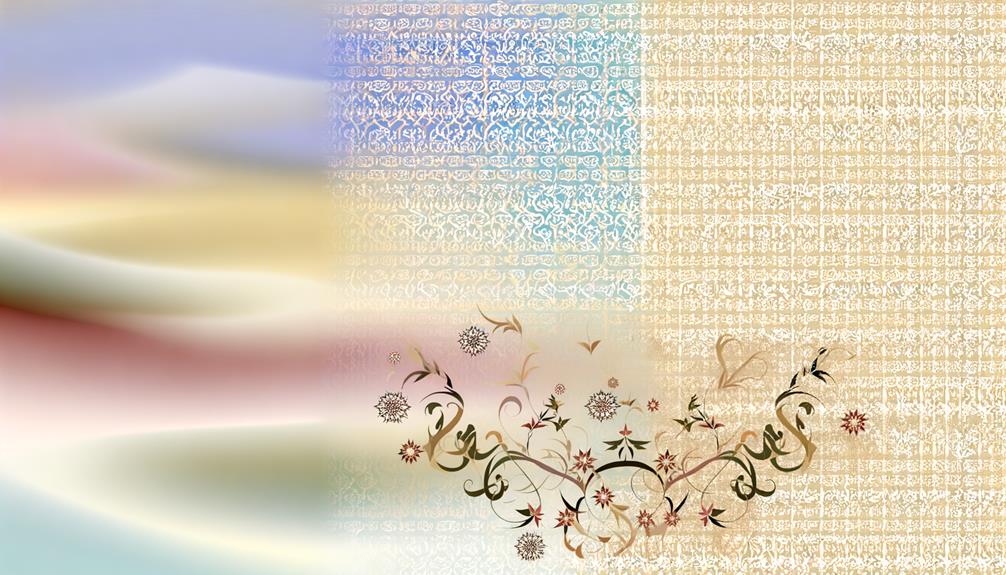Aadam Name Meaning in Urdu
The name Aadam, stemming from the Hebrew word “Adamah,” means Earth or ground. In Urdu, Aadam (آدم) signifies the first human, reflecting creation and humanity's origins.
Its religious significance is profound, as Aadam is the first prophet in Islam, created from clay by Allah. He embodies unity and the universal human ancestor, emphasizing moral lessons and divine guidance.
Understanding Aadam's historical and cultural resonance gives you insight into its enduring legacy across various cultures. Explore further to fully appreciate the depth and significance of this timeless name.

Key Takeaways
- Aadam means "man" or "human" and is linked to the Earth, reflecting origins from the Hebrew word "Adamah."
- In Islamic tradition, Aadam is the first prophet created from clay by Allah.
- Aadam signifies the universal ancestor, emphasizing the unity and origin of the human race.
- The name embodies themes of human nature, obedience, and repentance in religious narratives.
- Aadam holds cultural and religious significance in Islam, Judaism, Christianity, and other faiths.
Origin and Etymology
The name Aadam, rooted deeply in religious texts, originates from the Hebrew word 'Adamah,' which means 'earth' or 'ground.' This etymology suggests a profound connection to the very substance of creation, emphasizing humanity's intrinsic link to the Earth.
In various cultures, especially within Islamic and Judaic traditions, Aadam's etymological background underscores the belief in humans being formed from the soil. Understanding this origin helps you appreciate the name's depth and the cultural significance it carries.
Additionally, the name Aadam has been transliterated into various languages, maintaining its core meaning while adapting to linguistic nuances. This rich etymological history lends Aadam a timeless quality, resonating across generations and geographies.
Religious Significance
Aadam holds profound religious significance, symbolizing the first human created by God in both Islamic and Judaic traditions. Recognizing Aadam's role helps you appreciate his importance in religious narratives.
Key points include:
- Creation: In Islam and Judaism, Aadam is considered the first human, crafted by God from clay, breathing life into him.
- Moral Lessons: His life embodies lessons on human nature, obedience, and divine mercy, offering guidance on ethical conduct.
- Universal Ancestor: Aadam is viewed as the progenitor of all humanity, emphasizing the shared origin and unity of the human race.
Understanding these aspects deepens your appreciation of Aadam's pivotal place in religious teachings and his enduring legacy across cultures.
Aadam in Islamic History
In Islamic history, you find numerous accounts detailing Aadam's creation, his life in paradise, and his subsequent role on Earth. Allah created Aadam from clay, breathing life into him, and appointing him the first human and prophet.
In paradise, Aadam and his wife Hawwa (Eve) lived in bliss until their transgression led to their descent to Earth. This event marked humanity's test of obedience and accountability. Aadam's role extended to being the first to receive divine guidance, which he imparted to his descendants.
His story embodies themes of repentance, divine mercy, and the human journey. Understanding Aadam's significance helps you appreciate the foundational aspects of Islamic teachings and the human condition.
Urdu Linguistic Meaning
When exploring the Urdu linguistic meaning of Aadam, you'll find that its etymology and origins are deeply rooted in ancient Semitic languages.
Aadam holds significant cultural importance as it not only refers to the first human in Islamic tradition but also represents the essence of humanity.
Understanding these aspects enriches your appreciation of the name's profound historical and cultural resonance.
Etymology and Origins
Frequently, the name 'Aadam' is deeply rooted in both linguistic and cultural traditions, reflecting its profound significance in Urdu.
The name 'Aadam' originates from the Hebrew word 'אָדָם' (Adam), which translates to 'man' or 'human'. In Urdu, it holds similar meanings, embodying the essence of humanity and creation.
To understand its etymology and origins, consider the following:
- Hebrew Roots: 'Aadam' derives from 'adamah', meaning 'earth' or 'ground', signifying the creation of the first human from the soil.
- Arabic Influence: In Arabic, 'Aadam' also implies 'made from earth', aligning with Islamic traditions.
- Urdu Integration: The name seamlessly integrates into Urdu, resonating with cultural and religious contexts.
This etymological journey underscores 'Aadam's' enduring legacy in Urdu.
Cultural Significance
The cultural significance of the name 'Aadam' in Urdu transcends mere nomenclature, reflecting deep-rooted values and spiritual beliefs.
In Urdu, 'Aadam' carries profound connotations, symbolizing the origin of humanity as the name of the first prophet in Islamic tradition. When you name someone 'Aadam,' you're invoking a legacy of wisdom, humility, and moral integrity.
It's more than just a name; it's an embodiment of virtues that are cherished in Urdu-speaking cultures. The name 'Aadam' resonates with the essence of creation and human dignity, reminding you of your intrinsic connection to a shared spiritual heritage.
This cultural depth makes 'Aadam' a name of immense respect and honor in Urdu-speaking communities.
Cultural Interpretations
When examining the cultural interpretations of the name Aadam, you should consider its historical significance and religious connotations.
The name holds a prominent place in Islamic tradition as the first human created by Allah, which adds profound spiritual meaning.
Additionally, its historical usage across various cultures highlights its enduring legacy.
Historical Significance
While exploring the historical significance of the name Aadam, one finds its profound roots in various cultural and religious traditions. This name carries a rich legacy, symbolizing human origins and inherent dignity.
In different cultures, Aadam is revered for its historical connotations:
- Ancient Semitic Cultures: Aadam, often linked to the word for 'earth' or 'ground,' signifies the creation of the first human from the soil.
- Middle Eastern Traditions: The name is associated with the early genealogies and foundational myths of humanity.
- Persian Culture: Aadam represents wisdom and the archetype of the first man.
Understanding these historical contexts enriches your appreciation of the name's depth, illustrating its enduring cultural importance.
Religious Connotations
In many religious traditions, Aadam embodies the archetypal figure of the first human, reflecting divine creation and human uniqueness. You'll find that his name carries deep spiritual significance across various cultures. In Islam, Aadam is revered as the first prophet, a role model of obedience and repentance. In Christianity, Adam represents the origin of humanity and the introduction of original sin.
Here's a brief comparison:
| Religion | Significance of Aadam/Adam |
|---|---|
| Islam | First prophet, exemplar of faith |
| Christianity | Origin of humanity, original sin |
| Judaism | First man, covenant with God |
| Bahá'í Faith | Symbol of human potential and error |
| Sikhism | No direct reference to Adam |
Understanding these perspectives enriches your comprehension of Aadam's profound cultural and religious impact.
Popularity and Usage
The name Aadam holds significant cultural importance and is widely used among Urdu-speaking communities. Its popularity can be attributed to several factors:
- Religious Significance: The name Aadam is directly linked to the first prophet in Islam, making it a favored choice among Muslim families.
- Cultural Resonance: Aadam isn't only a name but also a symbol of humanity and origin, resonating deeply within Urdu literature and poetry.
- Timeless Appeal: The name's simplicity and profound meaning ensure its continued usage across generations.
You'll find Aadam commonly chosen for newborns, reflecting a blend of religious devotion and cultural heritage. Its prevalence in Urdu-speaking regions is a testament to the enduring legacy and universal values it embodies.
Conclusion
In exploring the name Aadam, you've journeyed through its rich tapestry, woven with threads of history, faith, and culture.
You've seen how it stands as a beacon in Islamic tradition and resonates deeply in Urdu.
Embrace this name, not just as a label, but as a bridge connecting the past and present, embodying profound meanings.
Let its legacy inspire you, like a timeless melody echoing through generations, a tribute to heritage and identity.






